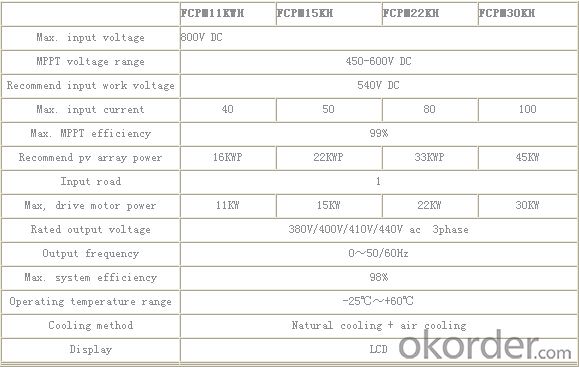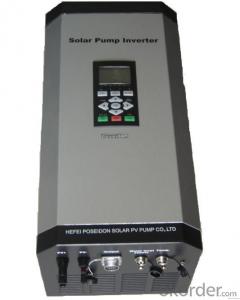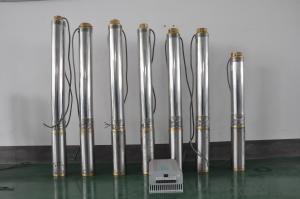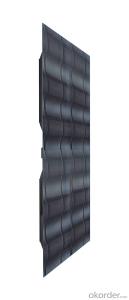Solar pump inverter FCPM22KH
- Loading Port:
- China Main Port
- Payment Terms:
- TT OR LC
- Min Order Qty:
- -
- Supply Capability:
- -
OKorder Service Pledge
Quality Product, Order Online Tracking, Timely Delivery
OKorder Financial Service
Credit Rating, Credit Services, Credit Purchasing
You Might Also Like
Solar pump inverter FCPM22KH Product Description:
Solar water pumping system is constructed with solar panel array,solar pump inverter and AC water pump, DC current produced from solar panel will be delivered to solar pump inverter,and it will convert it into AC current to drive water pump,and will automatically regulate output frequency according to sun radiance intensity,maximally realize MPPT tracking function.
Features
Adopting the proposed dynamic VI maximum power point tracking (MPPT) control method, with fast response, and reliable operation, achieves efficiency of 99%.
Designed with variable frequency driver, greatly improves efficiency
Extremely high efficiency
Digital mode control, with automatic operation and manual operation mode options
Complete protection functions
Adopts intelligent IPM module, with high reliability
LCD display and operation panel, in real time presents operating data
Optional for water level measurement and control circuit
Applicable for general ACC pumps, like centrifugal pump, piston pump etc.
Independent intellectual property; Highly effective, the redundant reliability, exempts the maintenance and the long life.
The pumps are soft started, fully protected.
No batteries are used. So better Sunlight, more water.
Datasheet.

- Q:How does the type of soil affect the installation of a solar pump?
- The type of soil can affect the installation of a solar pump in various ways. For example, sandy or loose soil may require additional stabilization measures to ensure the pump remains securely anchored. On the other hand, clay or compacted soil may pose challenges in terms of drilling holes or burying pipes. Additionally, soil composition can impact the efficiency of the pump by affecting the flow of water and the absorption of sunlight. Therefore, it is crucial to consider the soil type when installing a solar pump to ensure proper anchoring, efficient operation, and long-term performance.
- Q:How long do solar pumps typically last?
- Solar pumps have an average lifespan of 15 to 25 years, but this can be influenced by several factors. The quality of the system, the brand, and the maintenance it receives all play a role in determining the pump's longevity. In fact, well-maintained high-quality solar pumps can surpass the 25-year mark. To extend the lifespan of a solar pump, regular maintenance is crucial. This includes tasks like cleaning the panels, checking the wiring, and ensuring proper water filtration. Furthermore, selecting a reputable brand and a system that suits the specific application can also contribute to a longer lifespan.
- Q:How does a solar pump handle water with high levels of nitrates or other contaminants?
- A solar pump does not have the capability to handle water with high levels of nitrates or other contaminants. It is primarily designed to pump water for irrigation or drinking purposes, and it does not have built-in filtration or purification systems. In such cases, additional water treatment methods like reverse osmosis or activated carbon filters may be required to remove contaminants before using the water pumped by a solar pump.
- Q:How does the quality of the solar panels affect the performance of a solar pump system?
- The quality of the solar panels plays a crucial role in determining the performance of a solar pump system. High-quality solar panels are designed to efficiently convert sunlight into electricity, ensuring maximum power output. When solar panels are of good quality, they are more efficient at capturing solar energy, resulting in higher electricity production. This means that a solar pump system with high-quality panels will be able to generate more power, providing a greater amount of energy to run the pump and meet the desired water pumping requirements. In contrast, low-quality solar panels may have lower conversion efficiency, which can lead to reduced power generation. This can directly impact the performance of the solar pump system, as the lower power output may not be sufficient to operate the pump effectively or meet the desired water pumping needs. Moreover, the durability and reliability of solar panels are also important factors to consider. High-quality panels are typically made with superior materials and are built to withstand harsh weather conditions and environmental factors, ensuring a longer lifespan and consistent performance. On the other hand, low-quality panels may be prone to damage and degradation, which can lead to a decrease in power output and a shorter lifespan. Furthermore, the quality of solar panels can impact the overall system efficiency and maintenance requirements. High-quality panels are more likely to have advanced features such as anti-reflective coatings and self-cleaning mechanisms, which help to enhance energy absorption and reduce the buildup of dust and dirt. This ensures that the panels operate at their maximum efficiency and require less frequent cleaning and maintenance. Overall, investing in high-quality solar panels is essential to optimize the performance of a solar pump system. It ensures maximum power output, durability, and reliability, leading to efficient water pumping operations and long-term cost savings.
- Q:How does the cost of operating a solar pump compare to a traditional electric pump?
- The cost of operating a solar pump is generally lower than that of a traditional electric pump. Solar pumps utilize energy from the sun, which is free and renewable, to power the pump, resulting in significant savings on electricity bills. Additionally, solar pumps require less maintenance and have a longer lifespan compared to electric pumps, further reducing operating costs in the long run.
- Q:Can a solar pump be used for water supply in a farm?
- Yes, a solar pump can be used for water supply in a farm. Solar pumps use energy from the sun to power their operation, providing a sustainable and cost-effective solution for water supply in remote agricultural locations. They can efficiently pump water from a well, river, or other water sources, making them ideal for irrigation, livestock watering, and other farm water supply needs.
- Q:What is a solar pump?
- A solar pump is a device that uses solar energy to power a water pump. It converts sunlight into electricity, which is then used to run the pump and draw water from a well, borehole, or other water source. This technology is commonly used in areas with limited access to electricity or where traditional fuel-powered pumps are not feasible.
- Q:Can solar pumps be used for water supply in educational institutions or universities?
- Yes, solar pumps can definitely be used for water supply in educational institutions or universities. These pumps are a sustainable and cost-effective solution that utilize solar energy to power the pumping system. They can provide a reliable water supply for various purposes such as drinking water, irrigation, or sanitation needs, supporting the daily operations and activities of educational institutions and universities. Additionally, solar pumps contribute to environmental conservation by reducing dependency on fossil fuels and lowering carbon emissions.
- Q:Can a solar pump be used in areas with limited access to water storage tanks?
- Yes, a solar pump can be used in areas with limited access to water storage tanks. Solar pumps are designed to directly pump water from sources such as wells, rivers, or lakes, eliminating the need for water storage tanks. These pumps use solar energy to power the pumping mechanism, making them suitable for remote locations without access to electricity.
- Q:Can a solar pump be used for landscape watering?
- Yes, a solar pump can be used for landscape watering. Solar pumps are designed to harness energy from the sun and convert it into power to operate the pump. This makes them an eco-friendly and cost-effective option for watering landscapes, gardens, and other outdoor areas. They can provide a reliable and sustainable solution for irrigation needs, even in remote locations where grid power may not be available.
1. Manufacturer Overview |
|
|---|---|
| Location | |
| Year Established | |
| Annual Output Value | |
| Main Markets | |
| Company Certifications | |
2. Manufacturer Certificates |
|
|---|---|
| a) Certification Name | |
| Range | |
| Reference | |
| Validity Period | |
3. Manufacturer Capability |
|
|---|---|
| a)Trade Capacity | |
| Nearest Port | |
| Export Percentage | |
| No.of Employees in Trade Department | |
| Language Spoken: | |
| b)Factory Information | |
| Factory Size: | |
| No. of Production Lines | |
| Contract Manufacturing | |
| Product Price Range | |
Send your message to us
Solar pump inverter FCPM22KH
- Loading Port:
- China Main Port
- Payment Terms:
- TT OR LC
- Min Order Qty:
- -
- Supply Capability:
- -
OKorder Service Pledge
Quality Product, Order Online Tracking, Timely Delivery
OKorder Financial Service
Credit Rating, Credit Services, Credit Purchasing
Similar products
New products
Hot products
Hot Searches
Related keywords





























